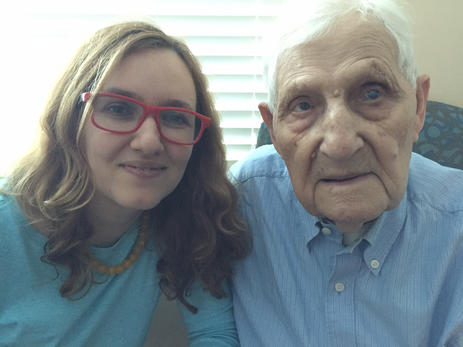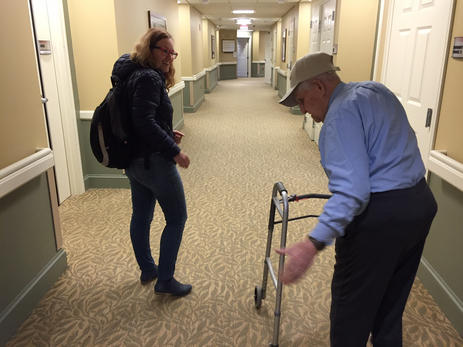

Over the years I have wondered what had become of Shlomo, the mystical man I found one day resting on my front steps in Lynn. He had a gentle face, kind blue eyes, and a quick smile. Before I had a chance to introduce myself, he spoke, and his voice and words were so comforting that I lowered myself onto a step and listened.
His words were Yiddish, a language I had heard most of my childhood but had forgotten after my parents had passed. Shlomo talked nonstop, and I eagerly soaked up his words, even though I understood only a fraction of what he was talking about.
No matter. I had met a new friend. All I knew was that he had come from the former Soviet Union, lived downtown in Lynn, and walked to synagogue every morning. For the next few years, we’d meet on the front steps. He did most of the talking, and while I never really understood what he was saying, I felt good sitting near him. I knew almost nothing about his life, and how he came to live in America, but he reminded me of my own relatives who had left Europe and sought a better life here.
After we moved, I would think about him and wonder why he had chosen to sit on my steps. Judaism holds that there are 36 holy people scattered throughout the globe who help sustain the world. Was Shlomo — the tender man with the raspy voice who appeared out of nowhere and would seemingly disappear after our conversations — one of the 36?
And then, last week, I heard that Shlomo Masis was still alive and had recently turned 100. His granddaughter, Julie Masis, was working on a book about him and told him another writer wanted to meet with him.
I found Shlomo sitting by his bedroom window on the fourth floor of an assisted-living facility in Peabody. He didn’t seem to remember me, but he offered up a big hug and what sounded like a blessing in Yiddish. He then reached into his top dresser drawer and pulled out an orange. “Take,’’ he said in Yiddish, handing it to Julie to peel.
If you know anything about the Holocaust, then his story will sound familiar. In 1941, in his mid-20s, he was working in a factory in his shtetl in Moldova. That fall, Romanian fascists loyal to Nazi Germany rounded up thousands of Jews in his town and made them remove their clothes and shoes. Wearing just underwear, they were sent on a barefoot 72-mile death march out of their village to a work camp in Ukraine. Along the way, a brother, Issac, was singled out — along with 150 others — to dig a huge pit, and when they were finished the Romanian soldiers gunned them down and pushed them into a mass grave. Of the thousands who marched, half were killed or died of starvation before they reached Obodovka, a Ukraine ghetto.
Somehow, Shlomo managed to survive three years in that ghetto. Jews slept in windowless, unheated sheds, sometimes alongside corpses that couldn’t be buried because the ground was frozen. He was sent to work on a farm, and befriended a Ukrainian family who fed him breakfast and gave him potatoes to bring back to the shed. His father, Srul, died in the ghetto, along with another brother, Chaim.
After the ghetto was liberated by the Russians, he was drafted into the Red Army as a radio operator. In 1945, he returned to his old street in Moldova, where he married, had two children, and worked in a tobacco factory. In 1992, he left for the United States and arrived in Lynn.
Shlomo insisted that I eat a part of the orange, and smiled when I acquiesced.
I wanted to know how he summoned the strength to survive.
He explained that it was mostly curiosity about the future of mankind. “I wanted to keep living to see who would win the war. I wanted to know how it would end,’’ he told me.
I asked him if he was angry with the Romanians or the Nazis. “I have forgiven them,’’ he said.
There were so many questions I wanted to ask, but the sun was going down, he wanted to eat dinner, and he explained that Yom Kippur was coming. He hummed a few bars of the seminal prayer “Avinu Malkeinu’’ — “Our Father, Our King’’ — which is recited at the end of the fast, and insisted that he would not be eating on the Jewish Day of Atonement.
He stood, leaned on his walker, and headed toward the dining room with Julie.
All these years later, Shlomo seemed the same: gentle, absent of judgment, delivering long sentences in a high raspy voice that soothed his guest and proved otherworldly. Instead of anger and blame, he had chosen to live and rebuild a world that focused on family. For a person who went through what he did, that seemed an almost impossible achievement.
Perhaps he really is one of 36 righteous who roam the world.
E-mail Steven A. Rosenberg at bostoncolumn@gmail.com.



